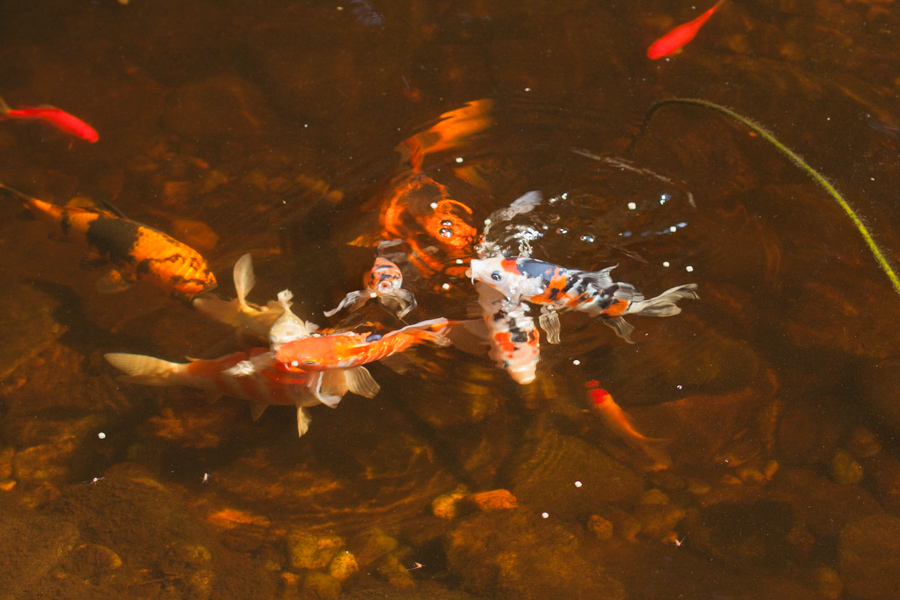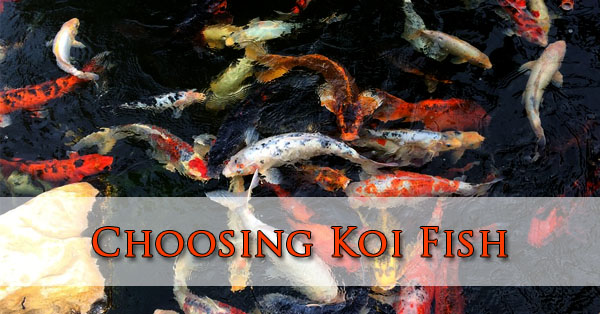
Here’s a complete “Koi Fish 101” beginner’s guide — covering everything you need to know to start keeping koi successfully, whether for a backyard pond or a large water garden:
🐟 What Are Koi Fish?
Koi are ornamental carp (Cyprinus carpio), bred for color and beauty. They’re hardy, intelligent, and can live 20–40 years — even longer with ideal care.
🏡 Ideal Habitat: The Koi Pond
✅ Minimum Pond Size
-
1,000+ gallons (larger is better)
-
At least 3 feet deep to protect from predators and temperature swings
📏 Space Rule of Thumb
-
Allow 250 gallons per adult koi
-
Don’t overstock — fewer fish = healthier pond
🌀 Filtration and Aeration
-
Strong biofilter to handle waste (koi produce a lot!)
-
UV clarifier to prevent green water (algae)
-
Aerator or waterfall for oxygen, especially in warm weather
🌡️ Water Quality & Parameters
| Parameter | Ideal Range |
|---|---|
| Temp | 59–77°F (15–25°C) |
| pH | 7.0–8.5 |
| Ammonia/Nitrite | 0 ppm |
| Nitrate | < 40 ppm |
| Oxygen | High |
-
Test water weekly with a quality test kit
-
Perform 10–25% water changes weekly to reduce waste buildup
🍽️ Feeding Koi
-
Feed 1–2 times/day (only what they eat in 5 minutes)
-
Use high-quality floating koi pellets
-
Supplement with treats: peas, lettuce, watermelon, oranges, shrimp
Note: In temps below 50°F (10°C), koi metabolism slows — stop feeding in winter unless using cold-water food.
🧊 Winter Care (for Cold Climates)
-
Koi can survive under ice if the pond is deep enough
-
Use a pond heater or de-icer to keep a breathing hole open
-
Don’t disturb hibernating fish too much — they’re delicate in cold temps
🛡️ Common Problems
-
Algae blooms – often caused by too much sun or overfeeding
-
Ammonia spikes – usually from overstocking or poor filtration
-
Parasites or ulcers – check for flashing, spots, or sluggish behavior
-
Predators – raccoons, herons, and cats love koi! Use pond netting or decoys.
❤️ Fun Facts
-
Koi recognize their owners and can be trained to eat from your hand
-
Colors include red, orange, yellow, white, black, blue, and cream
-
Varieties include Kohaku, Showa, Sanke, Ogon, and Butterfly Koi (long-finned)
📦 Koi Starter Checklist
-
✅ 1,000+ gallon pond (3′ deep)
-
✅ High-quality pond filter
-
✅ Aeration (air pump or waterfall)
-
✅ Water test kit
-
✅ Koi-safe dechlorinator
-
✅ Floating koi food
-
✅ Net and quarantine tank (for new or sick fish)
-
✅ Pond netting (predator protection)
🐠 Pro Tip:
Start with 2–3 koi, not 10 — they grow fast and need space. Also, quarantine new fish for 2–3 weeks before adding to your main pond to prevent disease.
Seasonal Koi Care Calendar
Here’s a Seasonal Koi Care Calendar tailored for Zone 9b / Arizona climates like Phoenix — where summers are extremely hot and winters are mild but can still stress pond ecosystems.
🌸 SPRING (March–May)
Koi wake up from winter dormancy — time to prepare for active growth.
🧼 Tasks:
-
Inspect and clean the pond, filters, and pumps
-
Perform large partial water change (25–50%)
-
Begin feeding easily digestible food (wheat germ or spring blend) once water is consistently above 50°F
-
Test water weekly (especially ammonia and nitrite)
-
Remove sludge and debris
🌱 Tips:
-
Start beneficial bacteria treatments
-
Quarantine and observe new fish before adding
☀️ SUMMER (June–August)
Koi are at their most active — but Arizona’s heat creates challenges.
🧊 Critical Concerns:
-
High temperatures (85°F+) can stress koi
-
Oxygen levels drop as water warms
✅ Tasks:
-
Feed 2–3 times daily, using high-protein growth food
-
Add shade (floating plants, shade cloth, pergola)
-
Use aerators or waterfalls to boost oxygen
-
Check for signs of sunburn or ulcers
-
Monitor ammonia, pH swings, and oxygen levels
-
Top off evaporated water with dechlorinated water
🔥 Pro Tip:
-
Keep the pond at least 50% shaded in July/August
🍂 FALL (September–November)
Koi begin slowing down as temperatures drop.
🍁 Tasks:
-
Gradually switch to wheat germ-based food
-
Cut back feeding as water approaches 60°F
-
Remove fallen leaves and decaying plant matter
-
Prune aquatic plants
-
Net the pond to prevent leaf buildup
-
Do a partial water change before winter
🔎 Watch For:
-
Early signs of parasites or ulcers (cooling water stresses koi)
-
Prepare your winter aeration or de-icer system
❄️ WINTER (December–February)
In Arizona, koi don’t hibernate fully — but they enter a semi-dormant state.
❄️ Key Conditions:
-
Stop feeding below 50°F
-
Koi metabolism is slow — too much food = risk of rot/death
✅ Tasks:
-
Monitor temperature and oxygen
-
Keep pumps and aeration running (but reduce surface disturbance if water is below 50°F)
-
Maintain a clean, stable environment
-
Watch for predator activity (they get bolder when food is scarce)
🧊 Note:
You likely don’t need a pond heater in Phoenix, but have one ready for cold snaps
📆 Summary Cheat Sheet:
| Season | Feeding | Water Temp Focus | Maintenance Focus |
|---|---|---|---|
| Spring | Resume (wheat germ) | Rising (50–70°F) | Clean pond, restart filters |
| Summer | Full feeding | High (75–90°F+) | Shade, aeration, frequent testing |
| Fall | Reduce gradually | Falling (60–50°F) | Net leaves, switch to cool food |
| Winter | Stop below 50°F | Cool (40–60°F) | Monitor only, no feeding |
Koi Fish For Sale In Arizona
Phoenix’s best choice in Koi fish is located conveniently in Peoria Arizona. The Backyard Pond has everything you need to start, maintain, and upgrade your backyard ponds. From the liner and aquatic plants to the Koi fish themselves we can help you get your dream Koi pond started. Stop by our store or give us a call to get your questions answered.
